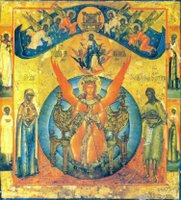 This is a reproduction of an ancient Russian Orthodox ikon of Holy Wisdom, shown in the foreground enthroned and surrounded by an emerald aura. Above Her, and smaller because the view is receding upwards into Heaven, is a throne on which is seated Jesus Christ the Son of God. And at the very top is an empty throne signifying the Father, whom no man has seen and no man can ever see. To the left is Mary the Theotokos (God-bearer) and to the right is John the honorable Forerunner and Prophet (the Baptist). Other saints are painted in the far left and right panels, and a host of angels are above.
This is a reproduction of an ancient Russian Orthodox ikon of Holy Wisdom, shown in the foreground enthroned and surrounded by an emerald aura. Above Her, and smaller because the view is receding upwards into Heaven, is a throne on which is seated Jesus Christ the Son of God. And at the very top is an empty throne signifying the Father, whom no man has seen and no man can ever see. To the left is Mary the Theotokos (God-bearer) and to the right is John the honorable Forerunner and Prophet (the Baptist). Other saints are painted in the far left and right panels, and a host of angels are above.I am posting this ikon, in case a woman I fellowshipped with at the Portland Greek Festival visits my blog. I told her about this unusual image, and I promised I would make it available on my blog. I have no comments to make about this ikon, other than it has hung in my home for many years, and we have always considered it, rightly or wrongly, an image of the Holy Spirit. That the image represents a female form is consistent with some traditions, that hold the Godhead to have masculine and feminine aspects. All this is, of course, speculation, but if you identify Wisdom personified in such Old Testament books as Proverbs, Ecclesiasticus and the Wisdom of Solomon (the latter two are not in Protestant Bibles, and are regarded by Orthodox as on a lower footing than the rest of Scripture, whatever that means), then this person of the Holy Triad could be depicted in feminine guise.
If you click on the image, a larger version will open, which will become full-sized (very large) if you click on the little four-way-arrow box in the lower right corner. You can then download the graphic, which is saved as a jpg file 1500px across.

It's a real nice depiction of Holy Wisdom. Why do you think it is potrayed in a woman's form? From the Book of Widsom, Holy Wisdom is also refered to as 'she'.
ReplyDeleteYes, that's why, because Wisdom in Greek is Sophia, and it is a feminine word, as in the Bible books.
ReplyDelete